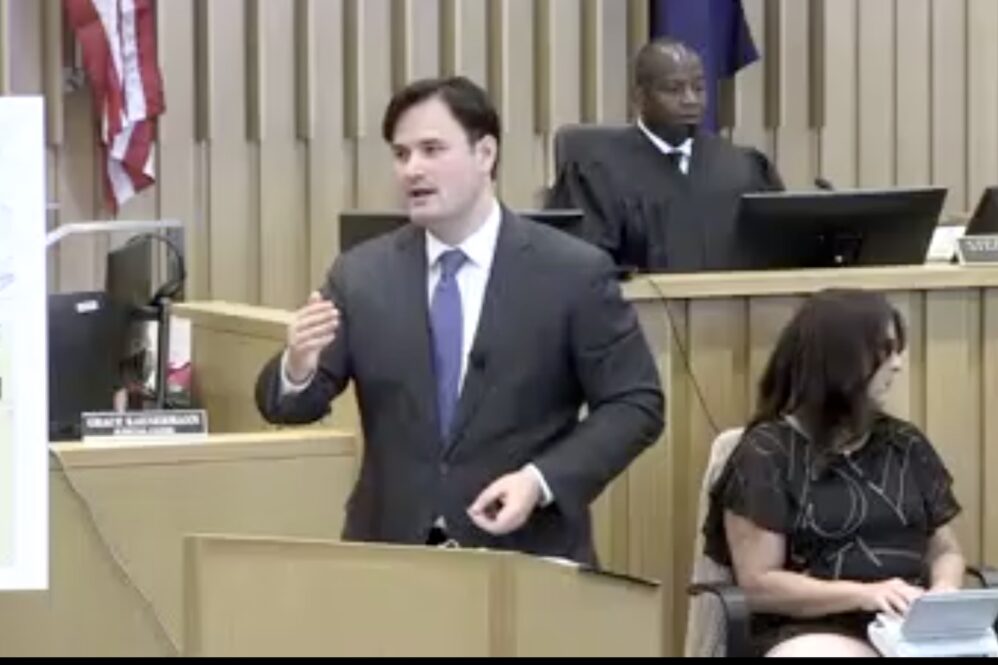Jurors will now decide a $2.2 billion class-action lawsuit against PacifiCorp after closing arguments were held Wednesday, June 7, in Multnomah County Circuit Court.
Seventeen named plaintiffs in James et al vs. PacifiCorp represent 5,000 survivors of the Santiam, Obenchain, 242 and Echo Mountain Complex fires that raged on Labor Day 2020.
They are seeking $600 million in economic damages, an additional $600 million due to defendants’ alleged negligence, and $1 billion in non-economic damages. Plaintiffs also requested punitive damages not to exceed five times other damages awarded by the jury, which could total multiple billions of dollars.
Jurors begin deliberations Thursday, June 8, and must decide if PacifiCorp negligently caused or intensified the fires.
PacifiCorp has denied liability and recently renewed requests for Judge Steffan Alexander to decertify the class of plaintiffs and dismiss the case. Alexander had not ruled on these motions June 7.
Closing arguments were wide-ranging and lasted around 8 hours. The following account focuses primarily on the Santiam Fire.
During closing arguments, plaintiff attorneys pointed to PacifiCorp’s financial resources as evidence of alleged negligence.
In the five years prior to 2020, PacifiCorp received $25.7 billion in revenue from ratepayers. During the same timeframe, they were given multiple warnings from state regulators about trees that were dangerously close to or in contact with its equipment, which one regulator termed “disturbing.”
Between 2015 and 2019 defendants budgeted $100 million to manage hazardous trees, or 0.004% of revenue. According to witness testimony, PacifiCorp executives told employees the company could not afford to dedicate more funds to vegetation management.
During these same five years, PacifiCorp paid $3 billion in dividends to shareholders, or 11.7% of revenue.
Plaintiff attorney Nicholas Rosnia said defendants actively chose to ignore a serious threat it could have prevented and failed in its obligation to protect local communities.
“They took no action at all, and the result (was) predictable as much as it was preventable,” he said.
In regard to the Santiam Fire, Rosinia told jurors they were allowed to find PacifiCorp liable even if power equipment was not the only alleged cause.
Witnesses testified multiple fires were sparked in the Santiam Canyon by PacifiCorp power lines as the existing Beachie Creek fire spread into the region from the east. Rosinia said a defendant can be liable in Oregon if their action or inaction were among substantial factors that harmed plaintiffs and they do not need to be the sole cause.
Defense attorney Doug Dixon focused on this nuance with the Santiam Fire and argued the preexisting Beachie Creek Fire was reason enough for PacifiCorp to be exonerated.
Dixon said plaintiffs offered no proof that the fires which started on Labor Day in the canyon were caused by any source other than the Beachie Creek Fire. He told jurors this means defendants could not be held liable to class members in The Santiam Canyon.
Dixon concluded, if jurors cannot find defendants liable to all class members, they cannot find defendants liable to any class members and on these grounds should rule in favor of PacifiCorp.
“If plaintiffs cannot show that Pacific Power caused harm to the entire class, that is reason enough for you to check the box ‘No’ on your verdict form,” said Dixon.
He also repudiated claims by plaintiffs that hundreds of firefighters were forced to evacuate the region after power lines allegedly sparked fires at Gates School and Fishermen’s Bend. Dixon said first responders willingly left because they did not have resources to battle a 100,000-acre fire, and that their absence from the area allowed the flames to intensify and spread.
He said everyone’s heart goes out to the fire survivors, but there was no ignoring the cause and effect of firefighters’ departure.
Dixon also addressed claims that PacifiCorp willfully destroyed evidence, including the disposal of damaged electrical equipment and deletion of international communications. He said there was no willful action taken to conceal evidence and plaintiffs were given access to all evidence in PacifiCorp’s possession.
“Everything that got retained, plaintiffs had the opportunity to inspect,” he said.
Dixon said defendants’ actions before and during the fires were in keeping with its “duty and obligation to provide power at all times.”
During plaintiffs’ rebuttal, Rosinia said defendants’ arguments reinforce the idea PacifiCorp is an unapologetic corporation that needs to be held accountable. He said the company has not disputed, or apologized for, the actions it took but argues it acted appropriately.
“Their view is they did everything right and they wouldn’t do anything different ever again,” He said. “…There’s no accountability, no remorse, no responsibility at all.”
Rosinia said PacifiCorp’s wildfire preparedness plan listed class members’ communities as low-priority, so in following its own procedures it disregarded potential harm to plaintiffs. He said official negligence is still negligence, and following the rules does not make up for causing lasting harm to fire survivors.
“They don’t get to define the scope of their own negligence,” he said. “…Nothing is more negligent than quite literally doing nothing.”
Access to court proceedings was provided through Courtroom View Network (cvn.com).
Editor’s note: This article has been corrected to accurately reflect the number of class members.

